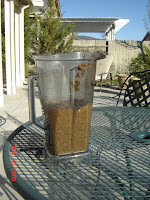
So because of my radish failure I'm convinced that my soil needs a lot of humus. Not only because of that incident but because these raised beds are brand new. So I decided to give my beds a super jump start since it's going to take a while for the compost in the bins to breakdown and I'm not going to spend anymore money on this garden(at least for this season.)
I took what I had in my kitchen bin, eggshells(calcium), rotten bananas(lots of potassium), plantain peels, oatmeal and veggie pieces and I put them in the blender with some water and viola! ...and with the help of the soil microbes this vitamin concoction should be readily available for my plants.
The "shake" ready to be mixed into the radish bed( I know it looks gross.) I also removed some little pebbles and sprinkled a small amount of Epsom salt and planted my radish seeds. I hope it works, and if not I'll keep trying till I finally get it, b/c I love radishes.



I'm not giving any advise about your compost pile, the composting failure that I am! But I do use my blender to grind up everything (including the coffee filters and egg shells) and either dump the sludge into the compost pile or "trench compost" it right into an empty garden spot. I have MUCH more luck with trench composting than with compost piles. My grandmother always trench composted in the paths in her garden, then would plant the pathways the following year while trench composting the previous year's rows.
ReplyDeleteMy compost success is up and down. Right now it's down. Even fresh from the farm horse manure wouldn't heat up.
ReplyDeleteIf nothing else, you're giving the worms exactly what they like and they'll be coming around to help your soil.
What does it mean "to heat up"? I've seen references to this in other blog posts about composting. Are there temperature implications in composting?
ReplyDelete